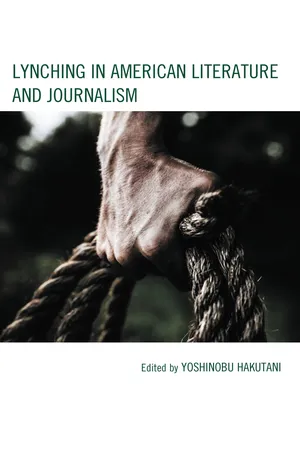
- 201 pages
- English
- PDF
- Available on iOS & Android
eBook - PDF
Lynching in American Literature and Journalism
About this book
Lynching in American Literature and Journalism consists of twelve essays investigating the history and development of writing about lynching as an American tragedy and the ugliest element of national character. According to the Tuskegee Institute, 4,743 people were lynched between 1882 and 1968 in the United States, including 3,446 African Americans and 1,297 European Americans. More than 73 percent of the lynchings in the Civil War period occurred in the Southern states. The Lynchings increased dramatically in the aftermath of the Reconstruction, after slavery had been abolished and free men gained the right to vote. The peak of lynching occurred in 1882, after Southern white Democrats had regained control of the state legislators. This book is a collection of historical and critical discussions of lynching in America that reflects the shameful, unmoral policies, and explores the topic of lynching within American history, literature, and journalism.
Frequently asked questions
Yes, you can cancel anytime from the Subscription tab in your account settings on the Perlego website. Your subscription will stay active until the end of your current billing period. Learn how to cancel your subscription.
No, books cannot be downloaded as external files, such as PDFs, for use outside of Perlego. However, you can download books within the Perlego app for offline reading on mobile or tablet. Learn more here.
Perlego offers two plans: Essential and Complete
- Essential is ideal for learners and professionals who enjoy exploring a wide range of subjects. Access the Essential Library with 800,000+ trusted titles and best-sellers across business, personal growth, and the humanities. Includes unlimited reading time and Standard Read Aloud voice.
- Complete: Perfect for advanced learners and researchers needing full, unrestricted access. Unlock 1.4M+ books across hundreds of subjects, including academic and specialized titles. The Complete Plan also includes advanced features like Premium Read Aloud and Research Assistant.
We are an online textbook subscription service, where you can get access to an entire online library for less than the price of a single book per month. With over 1 million books across 1000+ topics, we’ve got you covered! Learn more here.
Look out for the read-aloud symbol on your next book to see if you can listen to it. The read-aloud tool reads text aloud for you, highlighting the text as it is being read. You can pause it, speed it up and slow it down. Learn more here.
Yes! You can use the Perlego app on both iOS or Android devices to read anytime, anywhere — even offline. Perfect for commutes or when you’re on the go.
Please note we cannot support devices running on iOS 13 and Android 7 or earlier. Learn more about using the app.
Please note we cannot support devices running on iOS 13 and Android 7 or earlier. Learn more about using the app.
Yes, you can access Lynching in American Literature and Journalism by Yoshinobu Hakutani in PDF and/or ePUB format, as well as other popular books in Literature & Historical Literary Criticism. We have over one million books available in our catalogue for you to explore.
Information
Table of contents
- Cover
- Contents
- Acknowledgments
- Introduction
- The “Girl Reporter” Confronts the Lynch Mob
- Theodore Dreiser’s “Nigger Jeff”
- Theodore Dreiser’s “Nigger Jeff,” Richard Wright’s “Big Boy Leaves Home,” and Lynching
- Lynching as an American Tragedy in Theodore Dreiser’s Literary Works
- Faulkner on Lynching
- Lynching in Richard Wright’s “Big Boy Leaves Home”
- Lynching in Modern American Short Stories and Sexual Crime in Classic Myth
- The Southern Ritual of Lynching in Faulkner’s Light in August and Ellison’s Three Days before the Shooting
- The Electric Execution of Bigger Thomas in Wright’s Native Son
- Lynching as Surrealism
- Lynching in African-American Poetry
- Depictions of Racial Violence in the Work of Paul Laurence Dunbar
- Index
- About the Contributors